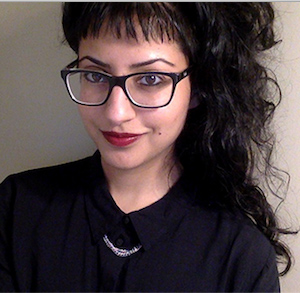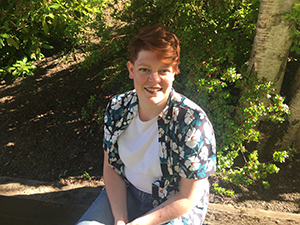An Alternate Archive: Meg Hands in Conversation with Shazia Hafiz Ramji

Shazia Hafiz Ramji, whose story “Selvon in Calgary” appears in The Malahat Review's fall issue #220, talks with Fiction Editorial Board intern Meg Hands about list-making, leaving a mystery at the end of the story, and the value of support without ulterior motives.
Shazia Hafiz Ramji’s writing was shortlisted for The Malahat Review’s 2022 Open Season Fiction Award and the 2022 Montreal International Poetry Prize. Shazia is the author of Port of Being. She lives in Vancouver and Calgary, where she is at work on a novel and some tunes.
How did you decide on the unusual structure of “Selvon in Calgary”? Did the structure inform the story or vice versa?
Thank you for these careful and generous questions, and for mentioning that the structure of “Selvon in Calgary” is unusual! I’ll take that as a compliment!
I have a habit of list-making (I talk about it a bit here) and the mini lists before each section are parts of that big list. I didn’t think about structure, which is unusual, because I usually feel or intuit or see (in a big-picture way) the form of a story before I write it, and then I write towards that structure of feeling. With this one, I was writing to see what would happen if I placed dissonant items from that list together (for example, lumberjack shirts, which are super popular in Calgary, juxtaposed with that bit of colonial history about Madrasi shirts). The lists are like the scaffolding of the story. I typed the mini list before the scene I was about to write, since I’d given myself the constraint that the scene would involve the things and experiences from that list. I do this frequently but delete the list / lines of poetry afterwards. For this story, I decided to keep the mini lists because they were creating an alternate archive (the “intangible Selvon” archive of the story) as I was writing. It felt too integral to delete this time!
The story is quite tight, with only four short scenes. Did you know before you started writing it what those four scenes would be, or was it a process of discovering what would make up this story?
I wrote this story very quickly in three days. I was writing to find out why it bothered me so much that Sam Selvon was a janitor at the University of Calgary, and then a writer in residence, and no one talks about him in Canada. I wrote to find out why all these facts were bothering me. (I also had to catch a flight back to Vancouver after those three days, and I decided I didn’t want to do anything at all on the flight, but I needed to write this because it was bothering me, so out it came!) I ended at four scenes because it felt like the story came to a natural end with the fourth scene. It’s strange to hear myself say that, because I still don’t know what the end of this story means, though I think about it sometimes before going to sleep… and I still don’t know what it means. I think it was Maria Vargas Llosa (I could be wrong) who said that there can’t be a story without a mystery or a question at its heart. I agree with that entirely. In the past I’ve lost the urge to write when I plan something out to the end, especially if I end up answering many questions along the way. “Selvon in Calgary” still has a question and a mystery at the end! I surprised myself with where the story went, which is what I always hope for as a writer!
There’s a lot of inspiration drawn from the life of Sam Selvon. Would you consider him an influence of yours? Do you consider anyone else an influence?
Selvon is a canonical author in England but not in Canada; the book he’s known for is The Lonely Londoners. I wouldn’t say that he’s a big influence on me, but I do think that he’s been important for me and so many others—for many reasons, one of which has to do with the challenge of what “English” and “dialect” can read and sound like (he is widely taught with this context). I came to Selvon because the University of Calgary holds some archival material with his name attached, but the files were closed. While writing this story, I deliberately chose not to research Selvon’s life and work deeply, because if I did, the story could have been more about him than about the “why” that began the story (i.e. why it bothered me that Selvon was a janitor at the University of Calgary, and then a writer in residence, and why he hasn’t been recognized more widely in Canada).
The narrator in “Selvon in Calgary” spends a lot of time alone. Do you find that spending time alone helps or hinders your creative process?
You know, I was asked this question once in 2019, when I was giving a keynote alongside David Chariandy (for the Post/Colonial Ports Conference in association with Writers Read in Montreal) and we shared a Q and A after. I wish I remembered the audience member who asked a question very similar to yours, because it’s been one I’ve thought about since, so I’m glad to have a chance to reflect and answer it again here. Thank you.
In Montreal I admitted to a packed room full of people, on stage, with David beside me, that being alone helps my creative process. David, the radiantly heart-centred intelligent human that he is, said that community helps his creative process. The minute he said that, I thought: oh shit, of course.
I badly wish I could change my answer, but there’s something inside me that doesn’t want to be anything that isn’t the most “me” anymore, so I want to say this: honestly, I work super hard just to be able to afford and maintain my loner-by-choice life, so, yes, I think spending time alone is important for my creative process in general. (That being said, the character in “Selvon in Calgary” is not me; the only thing we have in common is a past involving drugs.) Then again, community is very important, and not just because David said so (though I willingly listen to David about anything, no questions asked!).
David is someone I would consider as part of my community. He is one of the smartest and most generous people I know. He is a writer I admire deeply. He is so funny too! I feel very grateful to have come to a point in my life where I’m able recognize what it feels like to be supported. It might sound abstract, but not being able to recognize support and friendship in order to be able to receive it goes hand-in-hand with addiction; I’ve seen this clearly about myself this year, so I can say that being alone is just as important as having a community. “Community” to me means people who can be real with you (not many people risk this in a wholehearted way) and support each other genuinely, without ulterior motives. I’m so lucky to have friends whose way of being in the world reminds me of this every day.
I wish I could’ve said the above in 2019, but I couldn’t have said it because I wasn’t the same person that I am now.
What is inspiring you lately?
I read Tarot every day and it never fails to inspire! When you get really into it, reading Tarot asks you to be both analytical and creative and I love that! It’s so rare to find something else that works in this way (that isn’t writing or music!).
Going to galleries (even if the art is boring) can be a fun time too. Art writing is inspiring! I’m particularly proud of this piece I wrote recently. I love that feeling of sitting, looking and listening so intently and slowly, which is something that art writing requires, and which I endeavour to bring to my creative work too.
Also, Anne Carson’s Eros the Bittersweet—I cannot begin to explain how much of a gift that book is. I was prompted to pick it up again when a strange thing happened, which was that I virtually met someone whose voice evoked incomparable feelings of familiarity for reasons I couldn’t place. My instant response was a compulsion to get on a plane and move as far away as possible, despite wanting the opposite. When my flighty daydream happened, I thought: oh god, no one will understand except Anne Carson (!) (because I remembered she had said something about how these kinds of encounters i.e. of “Eros” are most potent when they make one see themselves clearly), so here we are now, seeing my latest inspo clearly!
The Eros-related quote from Eros the Bittersweet (which I’m going to emphasize is a really good book):
“As Sokrates tells it, your story begins the moment Eros enters you. That incursion is the biggest risk of your life. How you handle it is an index of the quality, wisdom, and decorum of the things inside you. As you handle it you come into contact with what is inside you, in a sudden and startling way. You perceive what you are, what you lack, what you could be.”
Carson’s conception of Eros reminds me of what Kazuo Ishiguro said about characters. He said he doesn’t think about character in terms of “character” but in terms of relationship; each character should be sufficiently transformed by the other in order for the story to work. Carson and Ishiguro have completely changed how I write!
So, to finally return to your question, I’ve been thinking a lot about the erotic, which has been a longstanding preoccupation.
Thank you for indulging me, Meg. I read The Malahat Review with reverence, so I’m thrilled to be here. Much gratitude to Iain for guiding this story to these pages, and to you for your questions that drove me to say some essential stuff. I hope you like “Selvon in Calgary” too.

Meg Hands
* * * * * * * *









